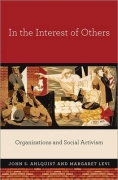| |||||
• polskie
• Zamów informacje o nowościach z wybranego tematu • kontakt |
IN THE INTEREST OF OTHERSAHLQUIST J.S. LEVI M.wydawnictwo: PRINCETON UNIVERSITY, 2013, wydanie Icena netto: In the Interest of OthersIn the Interest of Others develops a new theory of organizational leadership and governance to explain why some organizations expand their scope of action in ways that do not benefit their members directly. John Ahlquist and Margaret Levi document eighty years of such activism by the International Longshore and Warehouse Union in the United States and the Waterside Workers Federation in Australia. They systematically compare the ILWU and WWF to the Teamsters and the International Longshoremen's Association, two American transport industry labor unions that actively discouraged the pursuit of political causes unrelated to their own economic interests. Drawing on a wealth of original data, Ahlquist and Levi show how activist organizations can profoundly transform the views of members about their political efficacy and the collective actions they are willing to contemplate. They find that leaders who ask for support of projects without obvious material benefits must first demonstrate their ability to deliver the goods and services members expect. These leaders must also build governance institutions that coordinate expectations about their objectives and the behavior of members.In the Interest of Others reveals how activist labor unions expand the community of fate and provoke preferences that transcend the private interests of individual members. Ahlquist and Levi then extend this logic to other membership organizations, including religious groups, political parties, and the state itself. List of Figures ix List of Tables xi Acknowledgments xiii Chapter 1: Beyond Economism 1 Our Argument 5 The Cases 10 Alternative Accounts 15 The Chapters 18 Chapter 2: Building an Encompassing Community of Fate and Winning Consent 22 Leaders, Governance, and Organizational Performance 25 Modeling Organizational Scope and Governance 28 From Leadership Rents to Organizational Governance Institutions 38 Summary and Conclusions 43 Appendix 45 Chapter 3: Pork, Perks, and Predation 53 International Brotherhood of Teamsters (IBT) 55 The ILA 71 Discussion 77 Chapter 4: An Injury to Anyone Is an Injury to All 79 Commonalities Between the ILWU and WWF 80 ILWU 84 WWF 103 Tension between Political and Industrial Commitments 113 Continuity Over Time 114 Conclusion 118 Chapter 5: Managing Heterogeneity 120 Managing the Heterogeneity of Locals 121 Managing Individual Heterogeneity 135 Conclusion 152 Chapter 6: Provoking Preferences 155 The Literature 157 Preference Provocation 162 Evidence of Preference Provocation 168 Evidence of Contingent Consent 181 Conclusions 183 Chapter 7: Political Attitudes and Behavior among ILWU Members, with Amanda B. Clayton 185 Employment, Compensation, and Shipping Volumes on the U.S. West Coast 187 International Trade and Public Opinion 189 The ILWU's Organizational Principles and International Trade 192 ILWU Members' and Affiliates' Attitudes Toward Trade 199 ILWU Affiliates' Political Behavior 212 Robustness Considerations 216 Conclusion 219 Appendices 220 Chapter 8: Signaling Solidarity? 230 Bargaining, Strikes, and Politics 233 The ILWU 238 The WWF 251 Conclusion 256 Appendix 259 Chapter 9: Conclusions and Implications 261 Union Behavior 262 Other Membership Organizations 265 Firms 268 The State 269 Other Implications 272 Communities of Fate 276 Bibliography 279 Index 303 336 pages, Paperback Księgarnia nie działa. Nie odpowiadamy na pytania i nie realizujemy zamówien. Do odwolania !. |


